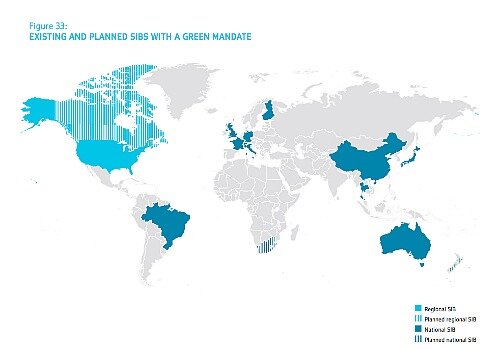The proponents of sustainable investing say that Switzerland needs a state-owned green bank. What response is their proposal receiving from exponents of the industry?
$3.5 trillion: that's how much we will need to invest every year to limit the increase in temperature to 1.5 degrees Celsius. It's an important figure that the Intergovernmental Panel on Climate Change (IPCC) has come up with. The Swiss Sustainable Finance (SSF) association has taken this to argue in favor of the inclusion of banks and insurers without which it won't be possible to halt climate change.
«Financial players are key for transforming our economies and societies into a system that reduces its greenhouse gas emissions and respects other planetary boundaries as well,» said the proponents of change towards a more sustainable economy in the introduction of a report published Wednesday. The paper lists several financial instruments available that can be utilized to support a more eco-friendly economy and society. And, what is new, they come out in favor of a green state investing bank for Switzerland.
The Big Players Are All Represented
SSF isn't just any NGO working on questions of finance. The organization was founded in 2014 and has branches in Zurich, Geneva, and Lugano, with 160 members and network partners. Among them financial-services providers, investors, universities, and government agencies. Jean-Daniel Gerber is the head of the association, having previously worked as a board member of Credit Suisse (CS). Alongside Gerber sit representatives of UBS, CS, Zuercher Kantonalbank, and Swiss Re.
The reports prepared by SSF are used as benchmarks in an industry that attempts to present guidelines for clients and investors. Both the Swiss Bankers Association (SBA) and the Asset Management Association Switzerland are giving reference to the SSF sustainability manifesto.
The green state investment bank may however stir more of a controversy. The association says that such a bank would be very effective in pushing the cause for more investments in climate-friendly technologies.
A European Climate Bank
Under the proposal, banks would provide risk capital, guaranteed by the state, and thereby prompt private investors to follow suit. Such state banks can also act as hubs to promote and exchange new technologies and sustainable finance. The idea is top of the European agenda, with Ursula von der Leyen having pledged to turn the European Investment Bank (EIB) into a climate bank. It is already part of the plan to generate 1 trillion euros against climate change by 2030.
The German Kreditanstalt fuer Wiederaufbau (KfW) also claims a green agenda. The institution was founded in 1948 to implement the Marshall Plan and is the third-biggest bank by balance sheet. It has emitted green bonds in the past and appears as sponsor of wind parks. KfW is able to provide favorable conditions thanks to its AAA rating as a state bank.
Tech Funds as a Start?
Similar state banks, some with an explicit mandate for sustainable finance, appear in the U.K., France, Italy, the U.S., Brazil, Australia, and China.
Taking the initiative would give Switzerland the chance to better implement projects that meet specific Swiss problems in the context of climate change. The bank could also act as a transmission belt to the financial market of Switzerland and tap into the know-how of banking, insurance, and raw materials trading.
The already available technology fund may act as a start to provide Swiss companies with loans for sustainable business models.
(Table: SSF)
Government Support
- Page 1 of 2
- Next >>




































